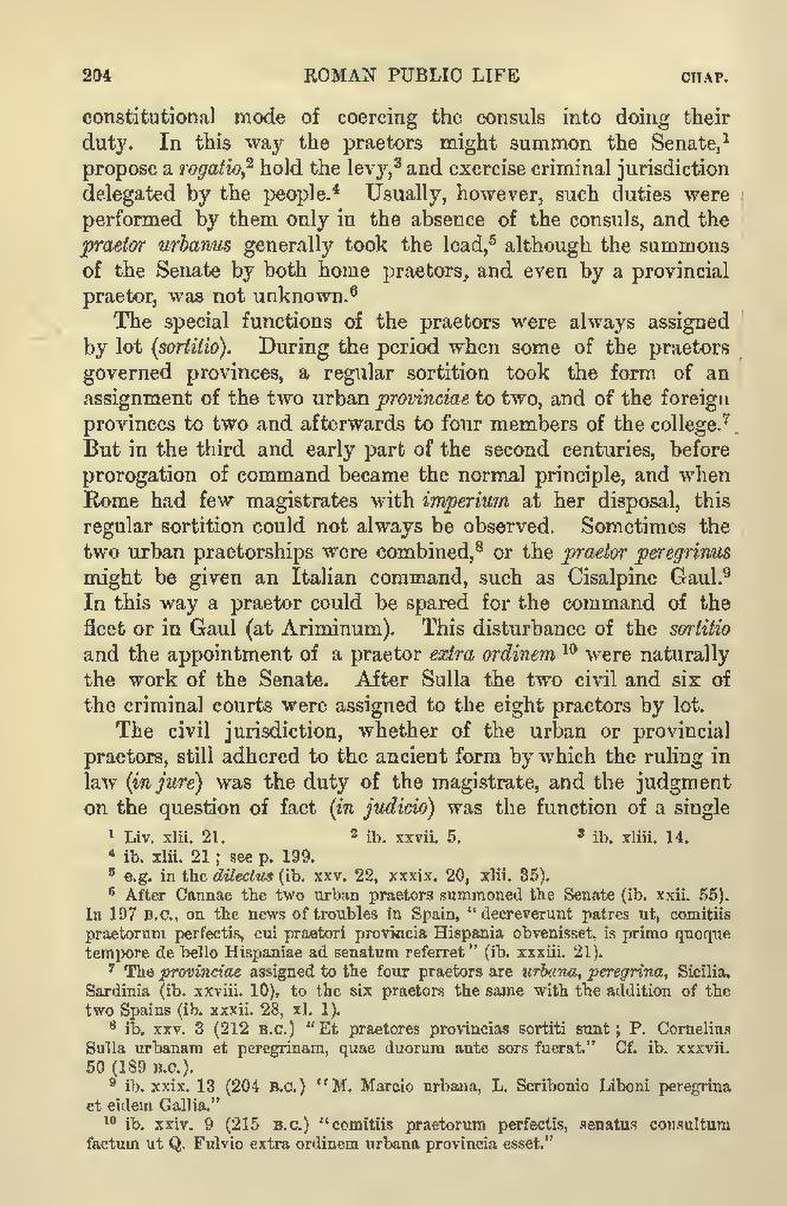constitutional mode of coercing the consuls into doing their duty. In this way the praetors might summon the Senate,[1] propose a rogatio,[2] hold the levy,[3] and exercise criminal jurisdiction delegated by the people.[4] Usually, however, such duties were performed by them only in the absence of the consuls, and the praetor urbanus generally took the lead,[5] although the summons of the Senate by both home praetors, and even by a provincial praetor, was not unknown.[6]
The special functions of the praetors were always assigned by lot (sortitio). During the period when some of the praetors governed provinces, a regular sortition took the form of an assignment of the two urban provinciae to two, and of the foreign provinces to two and afterwards to four members of the college.[7] But in the third and early part of the second centuries, before prorogation of command became the normal principle, and when Rome had few magistrates with imperium at her disposal, this regular sortition could not always be observed. Sometimes the two urban praetorships were combined,[8] or the praetor peregrinus might be given an Italian command, such as Cisalpine Gaul.[9] In this way a praetor could be spared for the command of the fleet or in Gaul (at Ariminum). This disturbance of the sortitio and the appointment of a praetor extra ordinem[10] were naturally the work of the Senate. After Sulla the two civil and six of the criminal courts were assigned to the eight praetors by lot.
The civil jurisdiction, whether of the urban or provincial praetors, still adhered to the ancient form by which the ruling in law (in jure) was the duty of the magistrate, and the judgment on the question of fact (in judicio) was the function of a single
- ↑ Liv. xlii. 21.
- ↑ ib. xxvii. 5.
- ↑ ib. xliii. 14.
- ↑ ib. xlii. 21; see p. 199.
- ↑ e.g. in the dilectus (ib. xxv. 22, xxxix. 20, xlii. 35).
- ↑ After Cannae the two urban praetors summoned the Senate (ib. xxii. 55). In 197 B.C., on the news of troubles in Spain, "decreverunt patres ut, comitiis praetorum perfectis, cui praetori provincia Hispania obvenisset, is primo quoque tempore de bello Hispaniae ad senatum referret" (ib. xxxiii. 21).
- ↑ The provinciae assigned to the four praetors are urbana, peregrina, Sicilia, Sardinia (ib. xxviii. 10), to the six praetors the same with the addition of the two Spains (ib. xxxii. 28, xl. 1).
- ↑ ib. xxv. 3 (212 B.C.) "Et praetores provincias sortiti sunt; P. Cornelius Sulla urbanam et peregrinam, quae duorum ante sors fuerat." Cf. ib. xxxvii. 50 (189 B.C.).
- ↑ ib. xxix. 13 (204 B.C.) "M. Marcio urbana, L. Scribonio Liboni peregrina et eidem Gallia."
